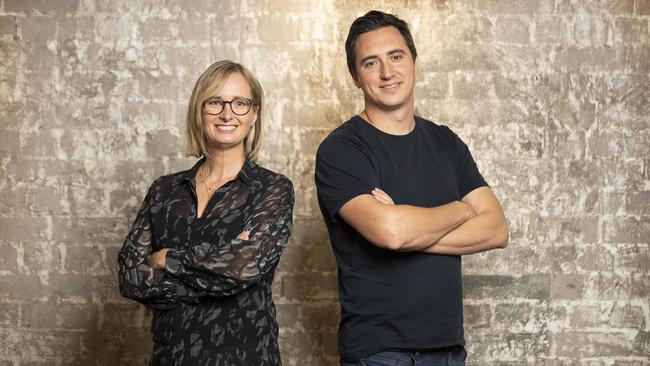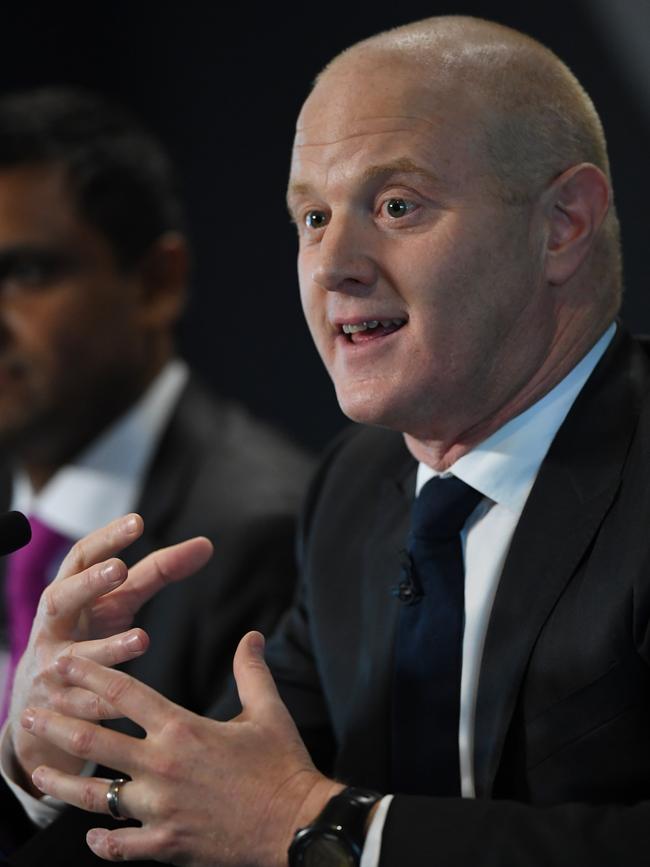Software firm elula says banks scratching surface with AI and leveraging data
Ian Narev-backed elula says banks are only ‘scratching the surface’ on leveraging data and AI to drive business value, despite fiercer competition for customers.

Banks are only “scratching the surface” on leveraging data and artificial intelligence to drive business value, despite fiercer competition for customers from their own industry and the technology sector.
That’s the view of Sydney-based AI software firm elula, which was founded by former Commonwealth Bank employees Sarah Russell and Josh Shipman in 2017.
Elula counts former CBA chief executive Ian Narev as an early-stage investor and also has the separate backing of billionaire Gretel Packer and Arnold Bloch Leibler partner Paul Rubenstein.
The company developed proprietary technology drawing on AI and machine learning to help predict when customers are at risk of leaving or when banks should proactively engage with them on new products. Elula has close to 20 customers including banks, credit unions and other mutuals and non-bank lenders.
Its bank customers include Suncorp and AMP and it counts one of the big four as a customer. “The market potential is enormous in this space,” Ms Russell said.
Accenture has estimated AI will add $US1.2bn in value to the global financial services sector by 2035 by freeing up employees from repetitive tasks, generic customer queries, mortgage reviews and market research.
Mr Shipman said elula’s technology could help reduce customer churn in a mortgage book by 50 to 60 per cent by drawing on 20,000 data points around reasons a customer may be seeking to leave their bank. The data monitored includes customer complaints, changes in income, printing of bank statements, property market dynamics and interest rates available in the broader market.
“It’s a hard nut to crack, this retention problem,” Mr Shipman added. “What we have inside it (the technology) is many hundreds of machine learning models, all competing against each other to deliver the best prediction.”
He said banks were typically grappling with 10 to 15 per cent turnover of customers in their mortgage books annually, although that was exacerbated last year amid a refinancing boom as customers sought to lock in record low rates.
Bureau of Statistics data shows monthly refinancing activity peaked at $17.8bn in August last year after a strong 18-month period, and has since pulled back to about $15.3bn in February.
Ms Russell and Mr Shipman are confident elula will continue to attract new business even in a rising interest rate environment.

While AI is getting more attention, regulators and other authorities are closely watching developments.
An International Monetary Fund research paper released last year said the accelerating shift would create opportunities but require efforts to develop minimum standards and guidelines.
“Concerns include a number of issues, such as embedded bias in AI/ML (machine learning) systems, the opaqueness of their outcomes, and their robustness (particularly with respect to cyber threats and privacy),” the report noted. “Furthermore, the technology is bringing new sources and transmission channels of systemic risks, including greater homogeneity in risk assessments and credit decisions and rising interconnectedness that could quickly amplify shocks.”
The report said that because of their complexity machine learning models required “constant oversight” to ensure cyber attacks were detected and managed.
UK regulators in February warned banks against using AI systems to approve mortgage applications unless they could show their algorithms weren’t biased against minorities.
Ms Russell said elula’s technology focused on providing lenders with recommendations and leads so employees could then decide whether to engage with the identified customers.
“We’ve been very conscious about removing that black box that sits around the algorithms and actually using the explainable AI algorithms, which is about unpacking why the prediction was made in the first place and understanding what the reasons were for that prediction,” she added.
Several players are making strides in the AI space. In November, Commonwealth Bank made a bigger push into AI by striking an alliance and buying a minority stake in Silicon Valley-based H2O.ai. The bank expects the partnership to boost its ability to personalise offers and customer engagement, which would aid in acquiring and retaining customers. H2O.ai also counts PayPal, PwC and Goldman Sachs among its customers.
Start-up Sherlok is drawing on AI and proprietary technology to screen data points and labels in a loan book. That enables it to predict the risk of a mortgage broker’s customer being unhappy with their rate and being open to better offers.
Ms Russell worked directly for Mr Narev in CBA’s corporate strategy team and she and Mr Shipman say having banking experience is a key to ensuring elula resonates with industry players.
Mr Narev said he had provided the elula duo with a few suggestions, although the firm was already getting traction by spotting new opportunities and innovating. “Elula quickly understood the potential for applying AI to customer retention, which has been an intractable problem for banks and other organisations over time. It now has five years of experience in this very specialised area, and has proven its capability, and its customers are seeing quantifiable value creation.”
“I am pleased with what they have achieved.”
Suncorp’s banking and wealth chief Clive van Horen said it partnered with elula to improve customer experience in the home ownership journey.
Elula – which has so far conducted two funding rounds – expects to break even within the next three years even as it pursues its growth strategy. The strategy includes rolling out new products and examining a move into other markets including New Zealand, Canada and the UK.
It also plans to hire a further 10 data scientists or engineers to add to the 30 it has currently.
The company’s products include Sticky, which monitors and predicts retention, and Nudge which identifies which customers may be responsive to prompts for products and services.
Bank of Queensland, which is not a elula customer is also stepping up its use of AI, according to CEO George Frazis.
“We have actually employed AI on various parts of our processes, particularly on the risk side as well … and in terms of fraud. There‘s opportunity for us to go further on that,” he said.
“We‘re doing interesting things to number one identify when a customer mortgage customer is happy or looking for a change and trying to get early into that process. And that enables us then to engage with the customer.”






To join the conversation, please log in. Don't have an account? Register
Join the conversation, you are commenting as Logout